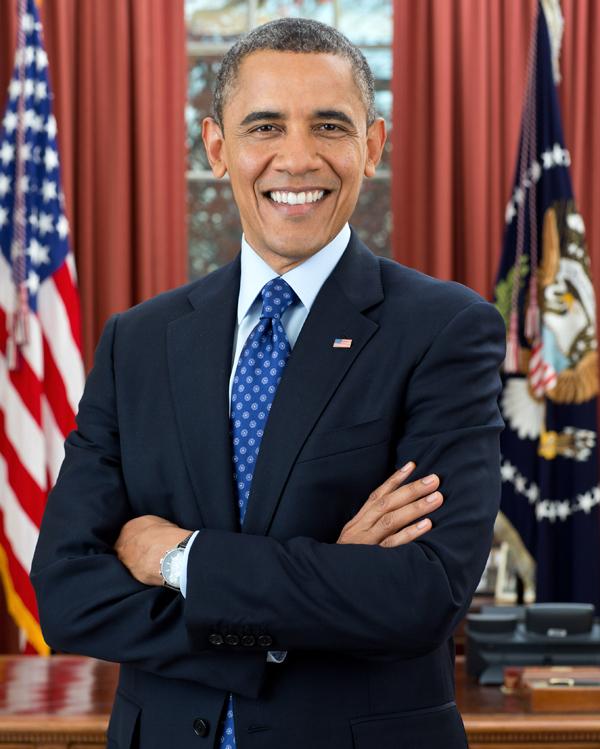Obama Takes Action on Gun Violence
(Official White House Photo by Pete Souza)
President Barack Obama is photographed during a presidential portrait sitting for an official photo in the Oval Office, Dec. 6, 2012.
Frustrated with obstructionism from the Republican-controlled Congress and the National Rifle Association, President Obama signed 23 executive orders during the first week of January in an attempt to reduce gun violence in the U.S. After an emotional speech outlining his plans to the nation on Jan. 5, Obama signed the orders, which focus on background checks, mental health treatment and sharing that information on the state and federal levels.
Republican presidential candidates Sen. Ted Cruz, R-Texas and Sen. Marco Rubio, R-Fla. have vowed to overturn these orders if elected, but Attorney General Loretta Lynch, the latest Obama appointee, is taking steps to make that a difficult task. In an interview with New York Magazine Lynch said, “My goal is to position the [Department of Justice] where it will carry on in all of these issues long after myself and my team have moved on.”
Speaker Paul Ryan, R-Wis. said the legality of the orders will be challenged, but historically these orders have only been overturned by subsequent administrations who disagreed with the laws.
Here are the 23 executive orders:
Gun Violence Reduction Executive Actions:
- 1. Issue a Presidential Memorandum to require federal agencies to make relevant data available to the federal background check system.
- 2. Address unnecessary legal barriers, particularly relating to the Health Insurance Portability and Accountability Act, that may prevent states from making information available to the background check system.
- 3. Improve incentives for states to share information with the background check system.
- 4. Direct the Attorney General to review categories of individuals prohibited from having a gun to make sure dangerous people are not slipping through the cracks.
- 5. Propose rule-making to give law enforcement the ability to run a full background check on an individual before returning a seized gun.
- 6. Publish a letter from the Bureau of Alcohol, Tobacco, Firearms and Explosives (ATF) to federally licensed gun dealers providing guidance on how to run background checks for private sellers.
- 7. Launch a national safe and responsible gun ownership campaign.
- 8. Review safety standards for gunlocks and gun safes (Consumer Product Safety Commission).
- 9. Issue a Presidential Memorandum to require federal law enforcement to trace guns recovered in criminal investigations.
- 10. Release a DOJ report analyzing information on lost and stolen guns and make it widely available to law enforcement.
- 11. Nominate an ATF director.
- 12. Provide law enforcement, first responders, and school officials with proper training for active shooter situations.
- 13. Maximize enforcement efforts to prevent gun violence and prosecute gun crime.
- 14. Issue a Presidential Memorandum directing the Centers for Disease Control to research the causes and prevention of gun violence.
- 15. Direct the Attorney General to issue a report on the availability and most effective use of new gun safety technologies and challenge the private sector to develop innovative technologies.
- 16. Clarify that the Affordable Care Act (ACA) does not prohibit doctors asking their patients about guns in their homes.
- 17. Release a letter to health care providers clarifying that no federal law prohibits them from reporting threats of violence to law enforcement authorities.
- 18. Provide incentives for schools to hire school resource officers.
- 19. Develop model emergency response plans for schools, houses of worship and institutions of higher education.
- 20. Release a letter to state health officials clarifying the scope of mental health services that Medicaid plans must cover.
- 21. Finalize regulations clarifying essential health benefits and parity requirements within ACA exchanges.
- 22. Commit to finalizing mental health parity regulations.
- 23. Launch a national dialogue led by Secretaries Sebelius and Duncan on mental health.
It does not appear that any of the executive orders would have any impact on the guns people currently own-or would like to purchase- and that all proposals regarding limiting the availability of assault weapons or large ammunition magazines will be proposed for Congressional action. As such, any potential effort to create a constitutional crisis—or the leveling of charges that the White House has overstepped its executive authority—would hold no validity.
Source WhiteHouse.gov

Sal Polcino is a professional jazz guitarist and published songwriter. Since coming to Glendale College he has been published in the Glendale News-Press...

